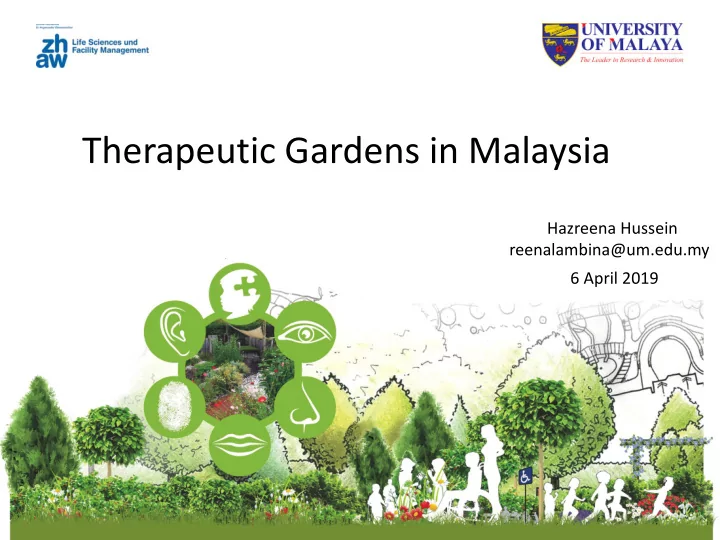

Therapeutic Gardens in Malaysia Hazreena Hussein reenalambina@um.edu.my 6 April 2019
Therapeutic Garden in between building: The Edible Roof Garden, Faculty of Built Environment
IEN has collaborated with University of Malaya to establish a green roof at the Faculty of Built Environment Before implementation During construction After implementation
Planting Plant identification Loosening the soil
Community gardening How to compose Maintenance: Watering and drainage
70 edible plant species is planted to document the increase in social activity level as well as the improved thermal comfort of this roof space
Example of medicinal plants Cat's whiskers ( Orthosiphon aristatus ) To stimulate urination; To treat diabetes, jaundice and fever. Grows up to 1m tall King of bitters ( Andrographis paniculata ) To treat colds, fever and stomach ache; To eliminate heat and toxins from body; Decoction of leaves (sometimes boiled together with Cat's Whiskers to treat diabetes and high blood pressure. Leaf poultice applied to skin to relieve itch from insect bites and rash. Grows up to 0.5m tall
Example of fruit plants Kaffir lime ( Citrus hystrix ) Leaves add a lemon flavour to various types of dishes. The rind can be added as green curry paste. Medium-sized shrub, sometimes a small tree, with spreading growth habit. Grows 3-4m tall Golden lime ( Citrus x microcarpa ) Fruits eaten fresh or made into juice to relieve coughs and colds
Example of culinary plants Lemon grass ( Cymbopogon citratus ) Crushed stalk produces a lemony flavour used in dishes and soups. Leaf stalk boiled to make tea to relieve stomach cramps and colic. It also extract essential oils used in perfumes and aromatherapy products. Clump-forming grass, 1-2m tall Curry leaf ( Murraya koenigii) Shrub 1-2m tall Leaves are used to flavour and enhance aroma in curries. Essential oil found in the leaves and seeds have antibacterial and anti-fungal activity.
Example of drought plants Stevia ( Stevia rebaudiana ) Fresh leaves used in salads and sweet herbal tea. Grows up to 1m tall. To treat diabetes, obesity, hypertension, fatigue, sores and infections; To improve digestion. Commercially cultivated for the leaves as artificial zero- calorie sweetener for food and beverages. Globe amaranth ( Gomphrena globosa ) Grows 20–60cm tall Flowers are steeped in boiling water to make a tea. The tea has fragrance with sweet taste. It contains vitamins C and E to reduce fatigue and slow aging. The long lasting and bright colour flowers is excellent for cut flower arrangement.
Example of rhizome plants Torch ginger ( Etlingera elatior ) Flower arrangement. Flower buds have a unique fragrance and taste used in common dishes in Malaysia. It can also be used as a garnish or added to salads. Grows up to 1m tall in large colonies. Other types of rhizome plants: Common ginger, Siamese ginger, Chinese ginger, Ginger lily, Sand ginger Turmeric ( Curcuma longa ) Its yellow-orange colour rhizome is used in Asian dishes, such as a spice and dye in curry powder. Young shoots and rhizome tips can be eaten raw as a spicy vegetable. To treat stomach aches, cold and skin infections; To beautify the face and body and also as a cloth dye.
Example of wet logged plants Pandan ( Pandanus amaryllifolius ) Leaves are not consumed but are used to add fragrance to drinks and desserts. Leaves are also used for food preparations and potpourri. Shrub up to 1m tall Water Dropwort ( Oenanthe javanica ) One of the most popular traditional vegetables in Southeast Asia. The flavour is similar to carrots or parsley. Leaves are used as a seasoning and young stems are used raw or cooked briefly. It is also a substitute for the celery. To treat fever and jaundice. creeping habit
Example of climbers Blue pea ( Clitoria ternatea ) Flowers are used to extract a blue, edible dye that is used in making traditional Malay desserts and adding fragrant when cooking rice. Roots are used to treat abdominal swelling and sore throats. Juice from the roots is mixed with cold milk as a remedy to remove chronic bronchitis. Red spinach vine ( Basella alba 'Rubra ’) Young leaves and stems eaten raw in salads, as steamed vegetable, or used as thickening agent in stews and soups. Leaves can be infused in hot water to make a tea substitute. Purplish sap from fruits used as food colouring in desserts. Cooked leaves reduce ulcers. Cooked roots relieve diarrhoea, or as paste for swellings.
References Additional information incl. the list of 70 edible plants : http://ien.com.my/news.html#greenroof@um Nparks Flora Fauna web : https://florafaunaweb.nparks.gov.sg/Home.aspx Omar and Hussein (2017) Therapeutic Sensory Stimulation Garden . Bakti Mind. danke!
Recommend
More recommend